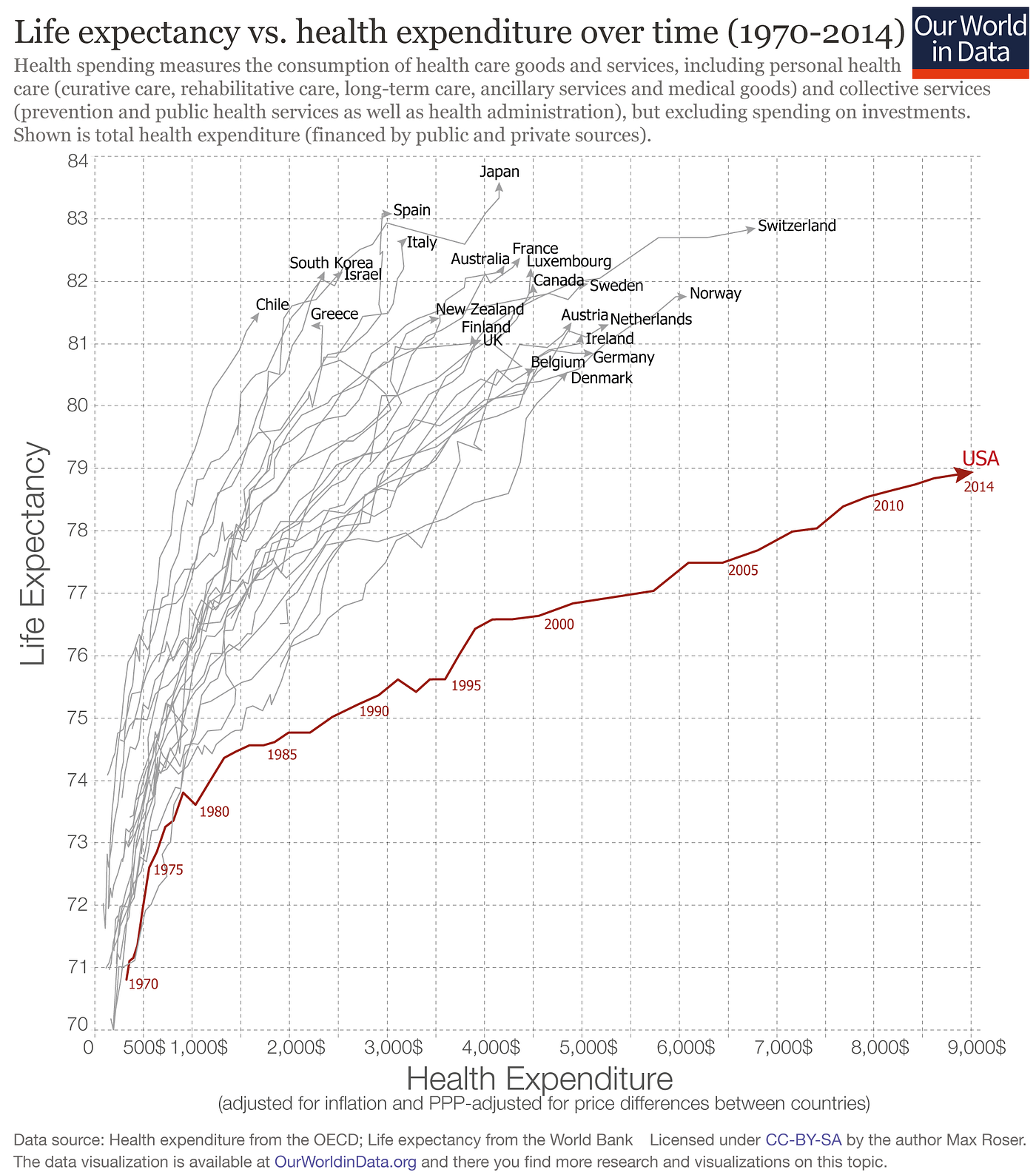
Universal health care isn’t just good for poor people — it’s good for rich people too. Here’s why.
It’s already pretty ridiculous that health care isn’t a right, but in an era when more and more of us are being cast into the pit of precarious, benefit-less gig-economy work, it’s time for that to change. Bernie proved that there is growing support for a Medicare for All universal health-care system across the country — even among Republican voters, and even among business-y Silicon Valley types.
Of course, Bernie’s power alone isn’t enough to get Medicare for All passed. (He is the most popular politician in the country, after all.) Rather, the way politics works is that if you want to get something passed, you have to build a coalition and get as many people as possible on board. And the biggest problem with getting universal health care in the US is that pro-business types — usually, but not always, on the right — argue that Medicare for All would be “bad for business.”
But is there any weight to this? Frankly, it seems a lot harder for an employer to go through the administrative hell of setting up employee health care as opposed to simply raising taxes a little and letting the government take care of it.
It isn’t that all Americans would necessarily disagree with the idea that businesses might have to make some small sacrifices in order to ensure that everyone can go to the hospital or see a doctor when they need to, but that in a time when so many people are struggling financially and are unable to find suitable employment — if they can find a job at all — they can be scared into opposing good policies if they think their already difficult financial situation will get worse.
The Flaws in the Current System
While the right loves to say that any change to the existing health-care system would be terrible for businesses, that claim has consistently proven to be bullshit. The GOP leadership declared that the Affordable Care Act (ACA) would kill jobs and worsen health outcomes, yet the reverse has happened; and if they do kill the ACA, studies suggest that 200,000 jobs would be lost in California and up to three million nationwide. Who’s killing jobs now?
That doesn’t mean that the ACA has solved all the country’s health-care problems. The existing system is a convoluted mess wherein a heavy administrative burden has been created by a multitude of private insurers; meanwhile, a lack of regulation of the price of services leaves the United States paying far more for health care than every other country in the OECD, and this exorbitant price gets paid both directly and indirectly by everyone, while health-insurance companies reap massive profits.
Single-Payer Provides a Competitive Advantage
Many US companies have absorbed the B.S. Republican talking points about universal health care; yet ironically, some of the same American companies, when operating outside the United States in countries with universal health care, have acknowledged how awesome a publicly funded health-care system could be.

In 2002, the Canadian subsidiaries of General Motors, Ford and Chrysler released ajoint letterwith the Canadian Auto Workers union praising Canada’s single-payer health-care system and encouraging the government not just to protect it but to expand it. They wrote that it ensured “essential and affordable health-care services for all Canadians,” and it made a significant contribution to the cost advantage of manufacturing in Canada compared to the United States.
In the United States, health-insurance costs are a significant burden on businesses, which gives Canada a competitive advantage due to its robust public health-care system. Businesses have a major cost taken off their balance sheets, which reduces the downward pressure on wages, and workers are not dependent on their employer for their health coverage. If the automakers support Canada’s single-payer health-care system, why not support a similar system in the United States? It’s not just automakers or manufacturers more generally who benefit from such a system, but also small businesses and entrepreneurs.
How They Do It in Norway
If the media is to be believed, there’s nothing that creates a larger disincentive for businesses to invest or for entrepreneurs to innovate than high tax rates. They’re never low enough for Republicans, who claim that tax cuts are the best way to drive economic growth. But if high tax rates destroy economies, how do the Scandinavian countries top the rankings not just for happiness, quality of life and social mobility, but also for start-up activity and entrepreneurs per capita?
In his profile of the start-up scene in Norway, Max Chafkin spoke to businesspeople who operate in both Norway and the United States, many of whom preferred the Norwegian system. The founders of a small clothing brand called Moods of Norway told Chafkin that state support was essential to helping them get their business off the ground, and that they didn’t mind the differences in tax systems. In Norway, they paid higher income taxes and payroll taxes for their employees, but the corporate taxes were much lower than in the United States.
Bjørn Holte, the CEO of the Norwegian company bMenu, was horrified by the American health-care system when he opened an office in New York City. “Americans don’t understand that you can’t have a functioning economy if people aren’t healthy,” he remarked. Even after the higher taxes, it was still cheaper to hire a software developer in Norway than in the United States because of the exorbitant cost of a family health plan — $23,000 per employee.
Entrepreneurs in Scandinavian countries, and all countries with universal health care, have greater peace of mind than their American counterparts. They don’t have to worry about what might happen if they get sick, and they also have government support to fall back on if their start-ups fail so they can get back into the workforce until they’re ready to try again.
In The Nordic Theory of Everything, Iilkka Paananen, one of the founders of video-game maker Supercell, explained how it was easier and less costly to start his company in Finland than in the United States. Supercell has 100 employees in Finland and only two administrative staff, yet in the United States, it needed four administrative staffers for just 20 employees.
It’s Time for Universal Health Care
The conventional wisdom that Medicare for All will be “bad for business” is not the reality, but just another way the right tries to scare Americans into supporting policies that go against their best interests. In truth, universal health care would have many benefits. Businesses would have a significant burden lifted from their balance sheets; entrepreneurs would have fewer worries when trying to get their start-ups off the ground; and workers would no longer have to rely on their employers for something as essential as health care. Plus, such a system would immensely reduce the overall cost of the health-care system by reining in prices and slashing administration costs. When even a coal miner in a heavily pro-Trump county agrees that health care should be a right of all people, and the audience responds with vigorous applause, it’s time to rethink how we do health care.







